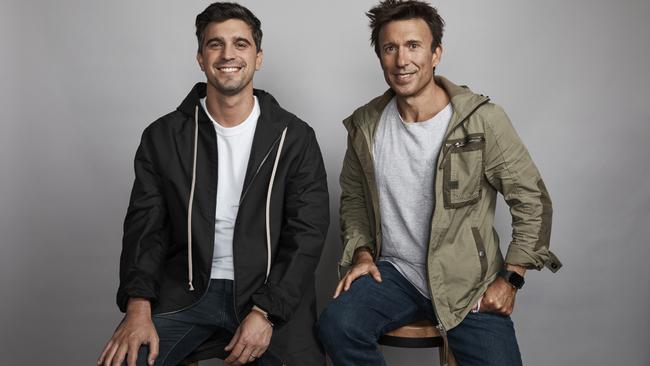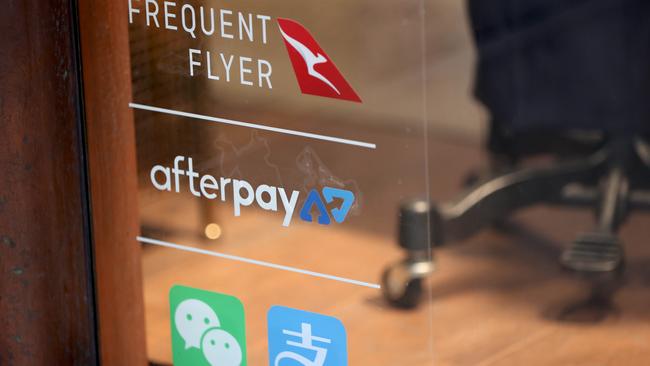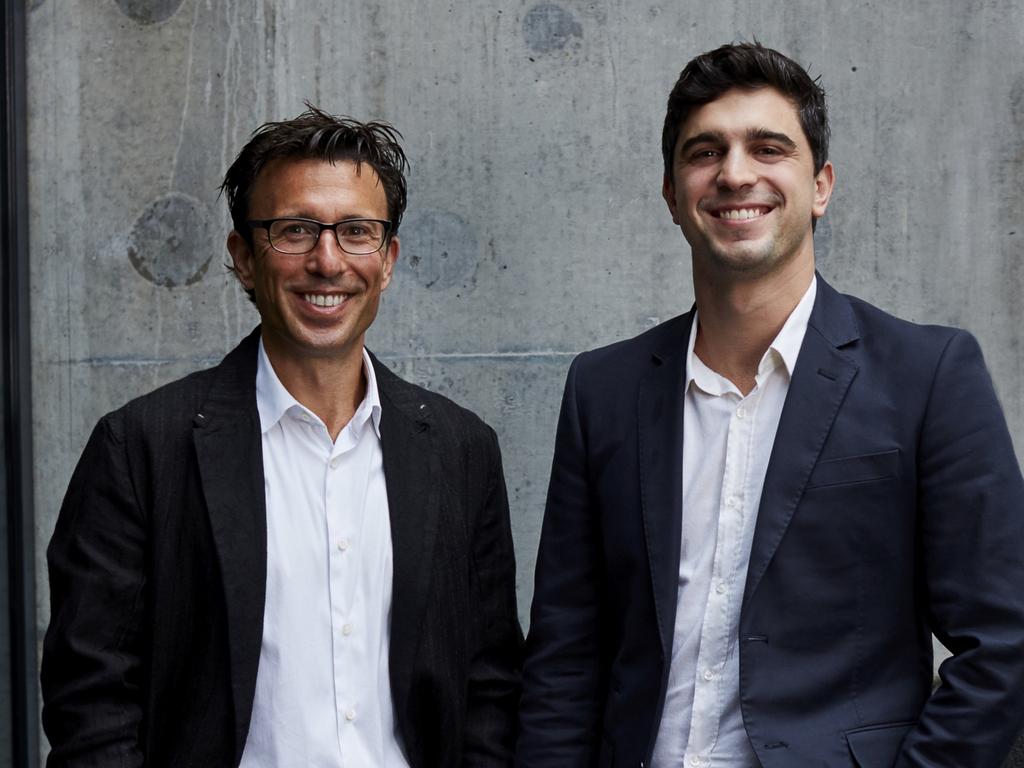Afterpay’s Nick Molnar and Anthony Eisen predict its record merger will soon be beaten
One half of the duo behind the biggest merger in Australian corporate history always knew it would go global but predicts its status will soon be dwarfed by newer players.

The duo behind the biggest merger in Australian corporate history, the Afterpay combination with US giant Block worth tens of billions, believe its value will soon be dwarfed by other emerging local tech companies.
Afterpay co-founders Nick Molnar and Anthony Eisen cleared the last regulatory hurdle for the merger on Wednesday when the Bank of Spain granted approval for the deal that has been mooted to be worth up to $39bn.
It caps a remarkable run for Australian tech companies in the past year alone, with NASDAQ-listed software firm Atlassian surging to be worth as much as $US100bn recently and the privately-held online graphics startup Canva achieving a $US40bn ($55bn) value after raising $US200m last September.
There are now likely more than 30 Australian tech “unicorns” alone worth more than $1bn as investor money continues to pour into the startup scene, but Mr Molnar said he was confident the local tech sector was still a long way from reaching its potential.
“I think if you fast forward five or 10 years I‘d say that these last three years will be a blip relative to what Australia will deliver [to] the global technology scene,” Mr Molnar told The Australian. “It’s just going to be a reality.
“I think it‘s amazing to see incredible companies distributing technology to the world in what wasn’t an overly distributed or exported industry. Talent is always at the centre of building great technology and it’s great to see that get exported and if we can continue to scale and build the technology industry I think it’s an amazing opportunity for Australia.”
Mr Molnar and Mr Eisen, one-time neighbours in Sydney, have built Afterpay into a powerhouse after only founding the company about seven years ago and then floating it on the ASX in mid-2017.
The deal to merge with Bock deal is the biggest step in what has been a remarkable rise for Afterpay, which was established when Mr Molnar, previously eBay’s biggest seller of jewellery in Australia, discussed an idea with neighbour Mr Molnar on how Millennials would be keener on a sort of debit card style arrangement for purchases rather than racking up credit card debt.
Afterpay’s pay in four instalments mode has gone on to be a stunning success as retailers around Australia and then the world quickly started offering it to customers.
It now has about 10.5 million users in the United States alone, which will be a big growth focus for the company given it will be part of the global Block ecosystem that includes its existing Seller and Cash App units.

Mr Eisen said he felt “proud to be part of an amazing group of companies like Atlassian and WiseTech” that have gone global in recent years, proving the strength and importance of the Australian tech sector.
“As a country I think we’ve always been more or less a recipient of technology innovation, particularly fin tech and other services. So whether it’s Google, Apple, Uber etc, it has all come here.
“To be part of that universe that has exported what I call ‘amazing just go for it’ Australian talent that doesn’t necessarily have previous overseas experience but has been able to make that leap, has inspired some [others].”
The nation’s leading tech companies – including Afterpay, Atlassian, Canva, Google Australia, Airtasker and Microsoft Australia – launched the Tech Council of Australia in August, bringing together tech moguls and start-up pioneers to position the country as a global hub and advocate for the sector.
Mr Eisen is on the Tech Council board alongside Atlassian co-founder Scott Farquhar, Tesla chair Robyn Denholm, Canva co-founder Cliff Obrecht and several other industry leaders.
He said the council was trying to put “misnomers right about” the local industry and that there are huge amounts of jobs, economic growth and other opportunities in tech. Just illustrating them is providing more inroads, whether it be capital, whether it be people and resources, or government and regulation focus on the things that need to happen.
“There’s a lot more work to do, but I do feel the momentum starting to really happen. And more startup companies are really finding different avenues to get a foothold.”
Mr Molnar said he always had some confidence Afterpay would be able to make a big move overseas by following its retailer clients into other markets, even when he and Mr Eisen were first pitching to investors in 2015.
“I like to tell Anthony that I always thought we were going to go global, especially when I bought the afterpay.com domain about nine months after our first [fundraising] round. And he thought I was crazy. So I’m happy we made that transaction.
“But it’s always been retailer led. It’s always been demand that’s been generated as a function of a product that performed really well and it was great to have the privilege to go and expand and just see that start to move across the world.”
He said he firmly believed that Afterpay was only just getting started in terms of its growth around the world and that “this transaction will have the chance to reflect our growth curve upwards in a really significant way.
“We are incredibly excited about what the next 12 months has in store for us given the tremendous opportunity with the Block family and how they can positively contribute from the seller side of the business with Square and the consumer side with Cash App.”
The merger was mooted as being worth up to $39bn when it was announced last August, based on the share price of Block (then called Square) in mid-2021.
Afterpay shareholders will receive 0.375 new Block shares for each Afterpay share they hold as at January 21.
But Block shares are down about 40 per cent in the past six months and almost 10 per cent since January 1, putting a current valuation of less than $25bn on the transaction.
Afterpay’s fortunes have surged and at times fallen rapidly since listing on the ASX in June 2017 and Mr Eisen has said the business was close to failing in its early days.
More recently, it has rebounded from a big fall in price when Covid first hit the world in March last year. Buy now pay later stocks including Afterpay have also been hit hard in the last two months as investor concern about the sector rises with regulatory inquiries into the industry underway in the US and Australia.
Afterpay shares will be suspended from trading on the ASX next Wednesday, January 19, and shares in the New York-listed Block will also trade on the ASX.








To join the conversation, please log in. Don't have an account? Register
Join the conversation, you are commenting as Logout